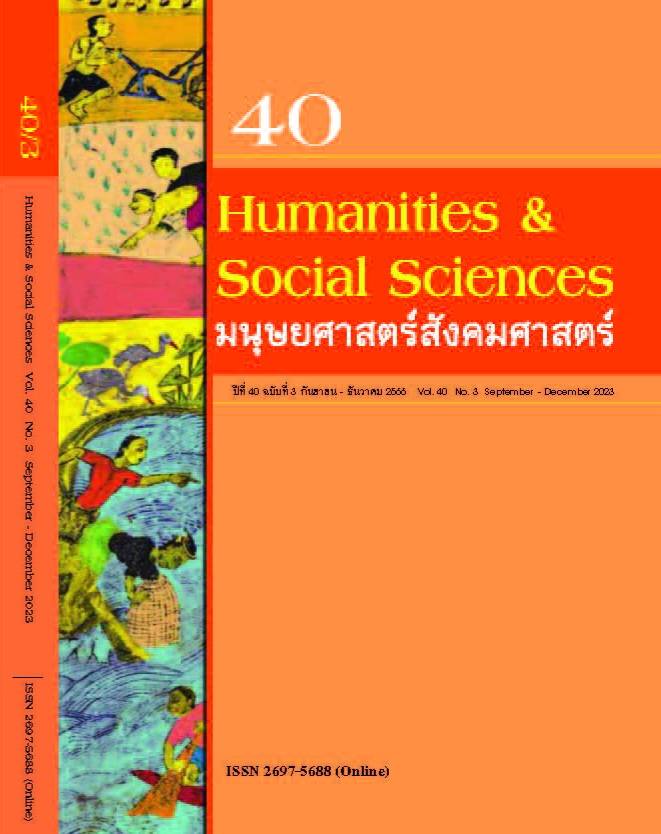ทัศนคติของผู้เรียนชาวไทยต่อภาษาอังกฤษในฐานะภาษากลางในประเทศไทย
Attitudes of Thai Learners towards English as a Lingua Franca in Thailand
Keywords:
English as a Lingua Franca, Thai English, Attitudes, World EnglishesAbstract
Abstract
This study aimed to investigate attitudes of Thai learners towards English as a Lingua Franca (ELF). The researchers recruited 225 students from seven universities in Chiang Mai using a purposive random sampling method. The main instruments used in the study were a questionnaire and a semi-structured interview. The questionnaire included Likert-scale items related to four issues regarding ELF. These issues were: 1) Native-speaker Model of English, 2) English as a Lingua Franca, 3) Acceptance of Thai English, and 4) Teacher Preferences. Results indicated that Thai learners still held strong attitudes on Native Speaker Model (x̄=3.56) while they also tended to be more positive on English as a Lingua Franca (x̄=3.49). In addition, Thai English was not so widely accepted (x̄=3.18), and learners’ preferences on native and non-native teachers were equally perceived (x̄=3.36). Overall, the study suggests that while Thai learners still value the Native Speaker Model of English, they also recognize the importance of English as a Lingua Franca. However, Thai English may not be widely accepted, and both native and non-native English teachers are proved helpful among the participants in learning English.
Keywords: English as a Lingua Franca, Thai English, Attitudes, World Englishes
References
Baker, W. (2012). English as a Lingua Franca in Thailand: Characterisations and Implications. Englishes in Practice, 1(1), 18–27.
Coupland, N. (2000). Rosina Lippi-Green, English with an accent: Language, ideology and discrimination in the United States. London: Routledge, 1997. Pp. xviii + 286. Hardback £50, ISBN 0 415 511476 4; paperback £15.99, ISBN 0 415 11477 2. English Language & Linguistics, 4(2), 317–335. https://doi.org/10.1017/S1360674300240276
Dalton, C., & Seidlhofer, B. (1994). Is pronunciation teaching desirable? Is it feasible? The 4th International NELLE Conference, 15–27.
Jenkins, J. (2000). The Phonology of English as an International Language. OUP Oxford.
Jenkins, J. (2009). English as a Lingua Franca: Interpretations and attitudes. World Englishes, 29(2), 200–207.
Jenkins, J. (2012). English as a Lingua Franca from the classroom to the classroom. ELT Journal, 66(4), 486–494.
Jindapitak, N. (2014). English pronunciation teacher preference: Thai university English learners' views. INTED2014 Proceedings, 4982–4991.
Jindapitak, N., & Teo, A. (2012). Thai tertiary English majors’ attitudes towards and awareness of world Englishes. Journal of English Studies, 7, 74–116.
Kachru, B. (1985). Standards, codification and sociolinguistic realism: The English language in the outer circle. In English in the World (pp. 11–30). Cambridge University Press.
Katchamat, P. (2017). An investigation of English Major Students’ Attitudes toward World Englishes, Native and Non-native English Teachers: A Case Study of Thepsatri Rajabhat University. The 17th Graduate Studies of Northern Rajabhat University Network Conference, 1225–1238.
Kirkpatrick, A. (2011). English as an Asian Lingua Franca and the Multilingual Model of ELT. Cambridge University Press.
Kirkpatrick, A. (2017). An ELF-aware Approach to ELT. English in South-East Asia Conference, KMUTT.
Lawrence, H. M. (2014). Foreign accent: the Phenomenon of non-native speech. Alene Moyer. New York, NY: Cambridge University Press, 2013. Pp. vii + 218. Studies in Second Language Acquisition, 36(4), 768–768. https://doi.org/10.1017/S0272263114000497
Leichsenring, A., McBride, P., Ogane, E., & Milliner, B. (2015). English as a Lingua Franca: Towards Changing Practices. JALT Conference Proceedings, 378–385.
McKenzie, R. M. (2008). Social factors and non-native attitudes towards varieties of spoken English: A Japanese case study. International Journal of Applied Linguistics, 18(1), 63–88. https://doi.org/10.1111/j.1473-4192.2008.00179.x
McKenzie, R. M. (2013). Changing perceptions? A variationist sociolinguistic perspective on native speaker ideologies and standard English in Japan. In Native-speakerism in Japan: Intergroup dynamics in foreign language education (pp. 219–230). Multilingual Matters.
Phothongsunan, S., & Suwannarak, K. (2008). Native and non-native dichotomy: Distinctive stances of Thai teachers of English. ABAC Journal, 28(2), 10–30.
Phusit, N., & Suksiripakonchai, W. (2018). A study of Thai university students’ attitudes towards pronunciation models in English as a Lingua Franca. International Journal of Social Science and Humanity, 8(1), 20–24.
Roach, P. (2009). English Phonetics and Phonology: A Practical Course (4th edition). Cambridge University Press.
Rubdy, R., & Saraceni, M. (2006). English in the World: Global Rules, Global Roles. A&C Black.
Seidlhofer, B. (2006). English as a Lingua Franca in the Expanding Circle: What is isn’t. In English in the world: Global rules, global roles (pp. 40–50). Continuum.
Seidlhofer, B. (2013). Understanding English as a Lingua Franca—Oxford Applied Linguistics. Oxford University Press.
Widdowson, H. G. (1994). The ownership of English. Journal of English as a Lingua Franca, 4, 359–372.



